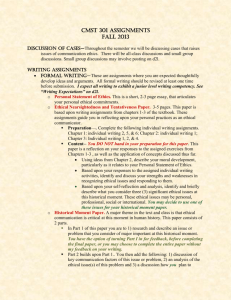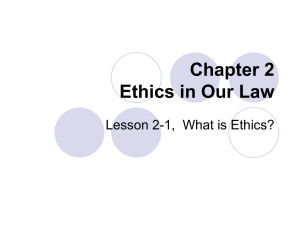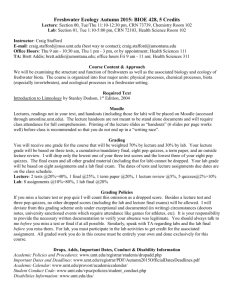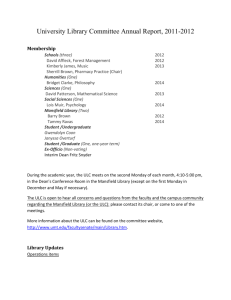ANTY 403E: Ethics and Anthropology
advertisement
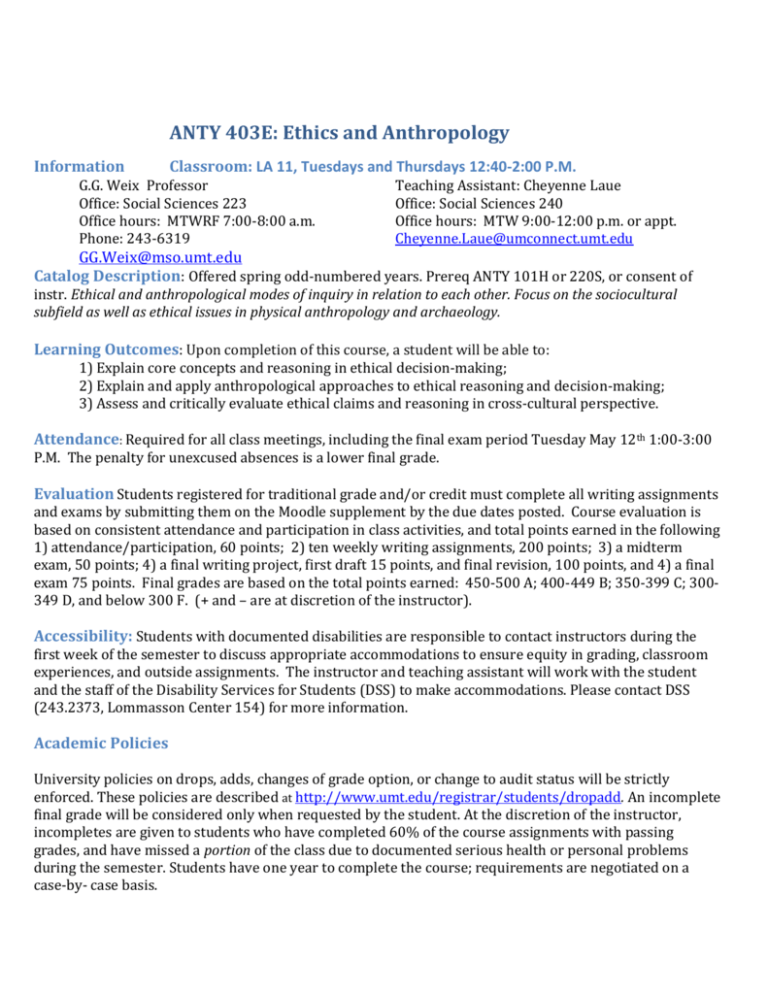
ANTY 403E: Ethics and Anthropology Information Classroom: LA 11, Tuesdays and Thursdays 12:40-2:00 P.M. G.G. Weix Professor Office: Social Sciences 223 Office hours: MTWRF 7:00-8:00 a.m. Phone: 243-6319 Teaching Assistant: Cheyenne Laue Office: Social Sciences 240 Office hours: MTW 9:00-12:00 p.m. or appt. Cheyenne.Laue@umconnect.umt.edu GG.Weix@mso.umt.edu Catalog Description: Offered spring odd-numbered years. Prereq ANTY 101H or 220S, or consent of instr. Ethical and anthropological modes of inquiry in relation to each other. Focus on the sociocultural subfield as well as ethical issues in physical anthropology and archaeology. Learning Outcomes: Upon completion of this course, a student will be able to: 1) Explain core concepts and reasoning in ethical decision-making; 2) Explain and apply anthropological approaches to ethical reasoning and decision-making; 3) Assess and critically evaluate ethical claims and reasoning in cross-cultural perspective. Attendance: Required for all class meetings, including the final exam period Tuesday May 12th 1:00-3:00 P.M. The penalty for unexcused absences is a lower final grade. Evaluation Students registered for traditional grade and/or credit must complete all writing assignments and exams by submitting them on the Moodle supplement by the due dates posted. Course evaluation is based on consistent attendance and participation in class activities, and total points earned in the following 1) attendance/participation, 60 points; 2) ten weekly writing assignments, 200 points; 3) a midterm exam, 50 points; 4) a final writing project, first draft 15 points, and final revision, 100 points, and 4) a final exam 75 points. Final grades are based on the total points earned: 450-500 A; 400-449 B; 350-399 C; 300349 D, and below 300 F. (+ and – are at discretion of the instructor). Accessibility: Students with documented disabilities are responsible to contact instructors during the first week of the semester to discuss appropriate accommodations to ensure equity in grading, classroom experiences, and outside assignments. The instructor and teaching assistant will work with the student and the staff of the Disability Services for Students (DSS) to make accommodations. Please contact DSS (243.2373, Lommasson Center 154) for more information. Academic Policies University policies on drops, adds, changes of grade option, or change to audit status will be strictly enforced. These policies are described at http://www.umt.edu/registrar/students/dropadd. An incomplete final grade will be considered only when requested by the student. At the discretion of the instructor, incompletes are given to students who have completed 60% of the course assignments with passing grades, and have missed a portion of the class due to documented serious health or personal problems during the semester. Students have one year to complete the course; requirements are negotiated on a case-by- case basis. Electronic devices and email Cell phones and other electronic devices should be turned off for the duration of class. Students who text in class and distract other students will be asked to leave. Laptop users must sit in the first row of the classroom. Please use official UM account to send and receive email related to the course. Make-up work University policy states that make-up work is allowed when a student can document that absences are due to participation in a University sponsored activity, which includes field trips, ASUM service, music or drama performances, intercollegiate athletic events, military service or mandatory public service (e.g., jury duty). To request make-up work for a missed class, a student must provide official documentation, and complete the assignment within one week. This does not apply to writing assignments and exams, since they are posted to Moodle one week prior to the due date. In the case of severe illness or emergency, exceptions will be made on a case-by-case basis, and extensions granted for up to one week. Contact the instructor with documentation regarding the nature of the illness or emergency. Extra credit There are no extra credit assignments offered in this course. Code of Conduct All students are expected to perform in accordance with the Student Conduct Code. The code is available at http://life.umt.edu/vpsa/student_conduct.php. Assignments referring to sources should conform to the American Anthropological Association style guide: http://www.aaanet.org/publications/style_guide.pdf (http://www.umt.edu/catalog/academics/academic-policy- procedure.php ) Plagiarism is representing another's work as one's own. It is a particularly intolerable offense in the academic community and is strictly forbidden. Students who plagiarize may fail the course and may be remanded to Academic Court for possible suspension or expulsion. Students must always be very careful to acknowledge any kind of borrowing that is included in their work. This means not only borrowed wording, but also ideas. Acknowledgment of whatever is not one's own original work is the proper and honest use of citation of sources. Failure to acknowledge whatever is not one's own original work is plagiarism. Required Readings Weekly readings and commentary assignments are posted to Moodle http://umonline.umt.edu/. Technical support is provided at http://umonline.umt.edu/techsupport/helpdesk.aspx. SYLLABUS WEEK ONE: Ethics, Writing and Theory January 27 Introduction: Syllabus, pre-test, goals and expectations 29 AAA Code of Ethics— discussion of professional ethics Reading: Whiteford, Whiteford and Trotter, Sterba EEK TWO: Ethics (and) Anthropology: Modes of Inquiry February 3 Liberal Arts and General Education 5 Moral and intellectual development Reading: Perry. Nussbaum WEEK THREE: Relativism and Commitment February 10 Cultural/Conceptual vs. Moral Relativism 12 Compared to What? Commitment and Alternatives Reading: Carson and Moser, Cowan, Rachels, Struhl, Trigg WEEK FOUR: Personhood and Respect February 17 Concepts of Person and Self 19 Loss, Suffering, Harm, and Healing Reading: Allen, Appiah, Carrithers, Pels WEEK FIVE: Agency and Imperatives February 24 Agents and Actions 26 Violence, law and legitimacy Reading: Jeganthan, Moskos, Ross WEEK SIX: Forms of Justice March 3 Auditing Love and Fairness 5 Film: The Anthropologist, Discussion of archives Reading: Strathern (Intro) James, Taylor WEEK SEVEN: Human Values March 10 Film: The Life and Times of Sara Baartman: Venus Hottentot, Discussion of museums 12 Film: Leona’s Sister, Gerri, Discussion of forensic sciences Reading: Harris, Geertz, Rosaldo, Schirmer MIDTERM Due Friday, March 13th WEEK EIGHT: Rationality and Justification March 17 Tests of Validity 19 Justification (class meets in the Buckhouse Room, Mansfield Library) Reading: Barnett, Endicott, Price, Wakin WEEK NINE: March 24 26 Hierarchy and Obligation Sanctions and Shame vs. Guilt Film: Nanook of the North, Revisisted, Discussion of ethnographic films Reading: Downing, Goodale, Meskell and Pels, Turner SPRING BREAK March 28 – April 5 WEEK TEN: Final Writing Project first draft due April 10th Affinities and Autonomy April 7 Affinities, Interests, and Autonomy 9 Allegories of Cultural Identity Reading: Kahn, Ross, Strathern (chapters 1 and 3) WEEK ELEVEN: Responsibilities and Rights Project feedback returned by April 14th April 14 NAGPRA and Bioarchaeology 16 TIPO Summit (participation to be arranged) Reading: Nader, Sen WEEK TWELVE: Ethical Politics and the Politics of Ethics April Collective Action and Politics Human Rights (CSWA Conference: Panel attendance Thursday and/or Friday) 21 23 WEEK THIRTEEN: Morality and Culture April 28 30 An Anthropology of Otherwise Fieldwork and the Classroom Final Writing Projects due Friday May 1st WEEK FOURTEEN: Writing Up and Down MAY 5 7 Final Exam due Tuesday, May 12th Academic Governance Anthropology and Policy Final: Tuesday, May 12 1:10-3:00 P.M. Course Evaluation and Post-Test Group VIII Ethics and Human Values courses familiarize students with one or more traditions of ethical thought. These courses rigorously present the basic concepts and forms of reasoning that define and distinguish each tradition. The focus of these courses may be on one or more of these traditions, or on a concept such as justice or the good life as conceptualized within one or more of these traditions, or on a professional practice within a particular tradition. Upon completion of an Ethics and Human Values course, students will be able to: * apply correctly the basic concepts and forms of reasoning from the tradition, professional practice they studied to ethical issues that arise within those traditions or practices; * analyze and critically evaluate the basic concepts and forms of reasoning from the tradition or professional practice they studied.






